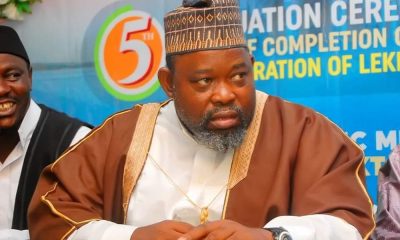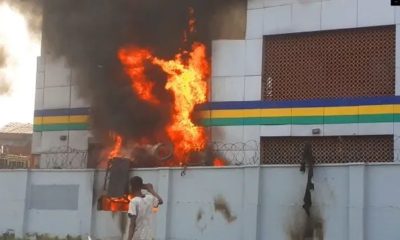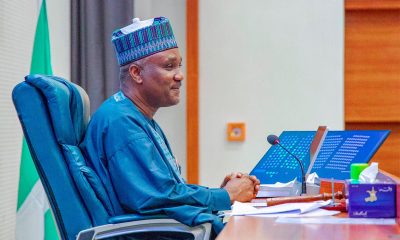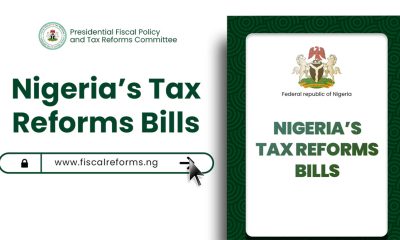“Government has not improved on the wheeling capacity of TCN (Transmission Company of Nigeria) as provided in the agreement. The government has not given them cost reflective tariff as provided in the agreement.”
Business
Power generation drops, Discos, FG battle for control

The planned takeover of three power distribution companies by Fidelity Bank and the restructuring of two others by the Federal Government have led to an intense battle between the Discos and the government.
The takeover of the three Discos by Fidelity Bank is being backed by the Federal Government through the Bureau for Public Enterprise.
This came as findings show that Discos have continued to launch fresh legal battles with a view to preventing their takeover by the government and the bank.
However, industry stakeholders are divided over the development with both parties receiving commendations and condemnations from power sector experts.
While industry stakeholders gave diverse views on the development, it was observed on Monday that power generation on the national grid dipped by about 141.3 megawatts when compared to what was recorded on the grid on July 9, 2022.
Figures obtained by our correspondent from the Federal Ministry of Power showed that power generation rose to a peak of 3,992.6MW on July 9, 2022, but the peak generation on July 10, 2022 fell to 3,908.8MW.
This dropped further on Monday, as data from the FMP showed that power generation on the grid as at 6am on July 11, 2022, was 3,851.31MW, indicating a drop of 141.3MW when compared to figures posted on July 9, 2022.
Meanwhile, industry experts have raised diverse concerns over the planned takeover and restructuring of some power distribution companies as recently announced by the Federal Government.
READ ALSO:
- Health Workers threaten solidarity strike in support of ASUU, NASU, Others
- Buhari Hosts 9 APC Governors In Daura
- BREAKING: Stop Keeping Students At Home, Buhari Goes Tough On ASUU
Last Tuesday the Federal Government announced the planned takeover of Kano, Benin and Kaduna electricity distribution companies by Fidelity Bank Plc after the bank initiated action to take over the boards of the three Discos.
It also announced through the Bureau of Public Enterprises that with the takeover of Ibadan Disco by the Asset Management Corporation of Nigeria, the BPE had obtained approval from NERC to appoint an interim managing director for the distressed power firm.
The government had further stated in last Tuesday’s restructuring notice that it was restructuring the management and board of Port Harcourt Disco to forestall the imminent insolvency of the utility. The notice was signed by the Director-General, BPE, Alex Okoh; and Executive Chairman, NERC, Sanusi Garba.
But in reaction to the announcement, the receiver/manager’s nominee of Integrated Energy Distribution and Marketing Company had argued on Wednesday that it was the legal and beneficial owner of 60 per cent (controlling and managing) shareholding interests in the Ibadan Electricity Distribution Company.
Also, the management of the Benin Electricity Distribution Company Plc had argued on Wednesday that there was no legal basis for the takeover of the company following the purported activation of the call on its collateralised shares by Fidelity Bank.
Commenting on the development on Monday, a member of the National Technical Investigative Panel on Power System Collapses (June 2013), who doubles as the President, Nigeria Consumer Protection Network, Kunle Olubiyo, told our correspondent that the move by the government should be commended.
He explained that ordinarily, the licensees had a 10-years tenure, as the mid-term review ought to have taken place five years into the post-privatisation exercise.
“This was not done across board,” Olubiyo stated.
He added, “The open book review, service level agreement, mass metering, investment in network improvement and overhauled, governance structure, the so-called (Discos) failed in all benchmarked global best practices and Key performance indicators.”
“As against investments in the immediate, medium and long term, what we saw was rent-seeking, profiteering and lack of fiscal responsibility and the much-needed discipline.”
Olubiyo noted that no sector could survive where there were no sanctions for impunity and no consequences for infractions.
“In the prevailing circumstances, we are on the same page with relevant stakeholders in the present efforts to clean up the mess and free our economy held by its jugular by the non-performing utilities,” the NCPN president stated.
In his submission on the matter, another power sector expert, Prof. Yemi Oke, observed that in 2009, the defunct Power Holding Company of Nigeria generated about 3,800 megawatts of electricity.
“Today, after all the noise about privatisation, the generation is 2,400MW,” he stated.
Oke added, “In 2009 NEPA (National Electric Power Authority)/ PHCN had only one MD/CEO (managing director/chief executive officer) managing the sector.
“Today and post-privatisation there are over 25 MDs/CEOs helping themselves from the revenue accruing from a paltry generation of 2,400MW. And they are Crying about illiquidity.
“Where will they have the money to service this inefficiency? 25 MDs/CEOs and over 100 executive directors etc, depending on 2,400MW. This is the problem: jobs for the ‘boys’! We’re in a deep, serious crisis as far of energy sector is concerned (petroleum, gas and power)!”
The professor stated that at least five Nigerian banks might collapse under heavy burdens of power-sector acquisition financing/lending.
He said three banks had gone already, adding that “one just revealed itself by this move.”
Oke added, “80 per cent of the Discos are technically insolvent, hence the problems of the power sector may continue. We will continue to experience an average of five to six national grid/system collapses per annum.”
The energy expert, however took a swipe at the BPE, describing the agency as incompetent in the handling of the power sector.
He said, “It suits their incompetence and ignorance of what they profess they know how to do best that Nigeria and Nigerians are worst-off in their post-power sector privatisation.
“They should be happier that a lot more industries have closed or been shut-down due to their breach of national confidence reposed in them. At least, no electricity to power industries.
“BPE should recall that this is a privatisation designed, midwifed and delivered by the BPE. Let them sell the remaining NDPHC (Niger Delta Power Holding Company) assets for ‘political patronages’ as usual. They lack moral basis to talk down on Discos and their owners.”
Also speaking on the matter, a public private partnership consultant, who took part in process for the privatisation of Nigeria’s power sector, Joe Tsavsar, argued that the government had not fulfilled most of its part in the agreements reached with power firms since the sector was handed over to private investors in November 2013.
He insisted that the government had not performed its obligations to the investors and must share in the blame of poor performance by operators in the industry.
Tsavsar said, “Government has not given the so called Discos the MW of electricity as provided in the agreement. The Discos can’t give what they are not given. Government has not given the Gencos (generation companies) gas to produce power as provided in the agreement.
Business
Naira opens 2025 on weak note against US dollar

Naira opens 2025 on weak note against US dollar
The Nigerian naira fell to N1,541.36/$ on the first trading day of 2025, marking a 0.36% decline from the closing rate of N1,535.82/$ recorded at the end of 2024, according to NFEM data on the Central Bank of Nigeria’s website.
Some authorised dealers quoted the dollar at N1,545/$, a slight improvement from the N1,550/$ quoted earlier in the week. Others quoted the naira at N1,520/$ at the close of trading on Thursday.
In the parallel market, the naira ended the day at N1,655/$, improving from N1,670/$ quoted on Tuesday.
The naira’s performance in 2024 saw a significant depreciation of 40.9% compared to its official rate of N907.11/$ at the close of 2023.
READ ALSO:
- 2025 sends off 2024 and its baggage of rubbish
- Jealous husband stabs Bishop to death over allege affair with wife
- Police arrest couple over alleged rape, assault of minor
The decline comes despite various foreign exchange policies introduced by the Central Bank of Nigeria (CBN) to improve market transparency and attract foreign investors.
One of the notable reforms was the December launch of the Electronic Foreign Exchange Matching System, which introduced new guidelines for authorised forex dealers. This initiative brought some stability to the naira towards the end of 2024.
Meanwhile, in the money market, the Nigerian Interbank Offered Rate saw declines across all maturities, indicating liquidity in the banking sector. The Open Repo Rate dropped by 0.61% to 26.69%, while the Overnight Lending Rate fell by 0.55% to 27.25%.
Trading in the secondary market for Federal Government of Nigeria (FGN) bonds remained subdued, resulting in a marginal increase in the average yield to 19.76%. In the sovereign Eurobonds market, buying pressure across various segments of the yield curve led to a 6-basis-point decline in the average yield to 9.62%.
Naira opens 2025 on weak note against US dollar
Auto
Jetour attributes Nigeria’s award to customers loyalty, innovation

Jetour attributes Nigeria’s award to customers loyalty, innovation
Jetour has been declared the fastest growing auto brand in Nigeria.
The award was announced on Wednesday December 11, 2024 in Lagos at an impressive ceremony organised by the Nigeria Auto Journalists Association (NAJA).
Jetour representative in Nigeria, Jetour Mobility Services, has taken to its Facebook page to celebrate its customers for making this to happen, attributing the success to its commitment to innovation in creating remarkable driving experiences.
Jetour known for its luxury offerings is one of China’s most revered auto brands, a marque of Chery Holding Group established in 2018.
It mainly produces crossovers and Sports Utility Vehicles (SUVs).
The recognition of Jetour as the Fastest Growing Auto Brand in the country is coming about a year after its introduction into the Nigerian market.
Jetour arrived in Nigeria in the last quarter of last year. And the SUVs available for this market are X70 – Liberty, X70 Plus – Elegance, X90 Plus – Cruise and Dashing.
Chairman of the NAJA Awards Organising Committee, Mr Theodore Opara, said despite being new in the Nigerian market, the brand was quickly able to secure a prominent place for itself in the highly competitive industry and received considerable attention from new car enthusiasts.
The committee, he added, had no difficulty in picking the brand as the fastest growing in the Nigerian auto market.
The name “Jetour” is a combination of the word “jet” and “tour”, which according to the automaker signifies a “convenient journey”. And its models try to depict this connotation in designs and performance.
Jetour Mobility Services said it considered the award a great honour, adding that it was a validation of its commitment to innovation and creating remarkable driving experiences.
The firm celebrates the award on its Facebook page with the following comments:
“We’re honoured to be named the Fastest Growing Auto Brand of the Year at the prestigious NAJA Auto Awards, powered by the Nigeria Auto Journalists Association.
“This achievement is a testament to our commitment to innovation, quality, and creating unforgettable driving experiences.
“A huge thank you to our amazing customers and everyone who has been a part of the journey — your trust propels us forward! Cheers to more milestones ahead!”
Jetour says its focus is to be a leader in mobility as well as provide reasonable travel solutions for individuals and families.
Its goal is to provide an excellent vehicle that demonstrates individuality for today’s young people, it adds.
As in the global market, the brand users in Nigeria are said to be an uncompromising group of individuals, unwilling to settle for less.
Jetour is not only winning in Nigeria, it is also a toast of a section of the Saudi market. One of its models, Dashing, recently won the Best Midsize Crossover Award for 2023-2024.
National Automotive Supply Company, the authorised distributor of Jetour vehicles in the Kingdom of Saudi Arabia, announced that the new and advanced Jetour Dashing won the “Best Midsize Crossover” award during the awards ceremony of the 11th edition of the “PR Arabia National Automotive Award” in Saudi.
Jetour Dashing was announced as the winner at the ceremony held in mid-November in Jeddah under the patronage of the Saudi Automobile and Motorcycle Federation and in the presence of several princes and VIPs, as well as representatives of regional offices of automotive brands.
Business
NNPC rejected Dangote $750m offer to manage Nigeria’s refineries, days Obasanjo

NNPC rejected Dangote $750m offer to manage Nigeria’s refineries, days Obasanjo
Former President Olusegun Obasanjo has disclosed that the Nigerian National Petroleum Corporation (NNPC) rejected a $750 million offer from billionaire businessman Aliko Dangote.
In an exclusive interview with Channels TV, former President Olusegun Obasanjo revealed that in 2007, Dangote offered a staggering $750 million to manage the Port Harcourt and Kaduna refineries.
Obasanjo explained that the Nigerian National Petroleum Corporation (NNPC), now rebranded as NNPCL, rejected the offer due to its inability to operate the refineries effectively.
READ ALSO:
- Why I persuaded Tinubu to reject Yar’adua’s finance minister offer – Senator Ojudu
- Fubara replies Wike: Odili right face, image of Rivers
- Why smoking cigarettes, taking alcohol not sins – Pastor Damina
He said, “Aliko got a team together and they paid $750m to take part in PPP (Public–public-private partnership) in running the refineries.
“My successor refunded their money and I went to my successor and told him what transpired. He said NNPC said they wanted the refineries and they can run it. I now said but you know they cannot run it.
“But I was told not too long ago that since that time, more than $2 billion have been squandered on the refinery, and they still will not work,” he added
NNPC rejected Dangote $750m offer to manage Nigeria’s refineries, days Obasanjo
-

 metro1 day ago
metro1 day ago‘Deepen Shariah knowledge to curb misinformation’
-

 metro1 day ago
metro1 day agoIlorin: Retired works controller murdered on New Year’s Day
-

 metro1 day ago
metro1 day agoJealous husband stabs Bishop to death over allege affair with wife
-

 metro1 day ago
metro1 day agoTinubu’s refusal to honour Seyi’s pact with us disappointing – Nnamdi Kanu’s family
-

 Politics3 days ago
Politics3 days agoHow Tinubu outsmarted Buhari to become president – Ojudu
-

 metro18 hours ago
metro18 hours agoMosques should be research centres – Varsity don
-

 metro3 days ago
metro3 days agoHorror in Ogun as twin brothers kill, dismember sex worker
-

 metro3 days ago
metro3 days agoFire razes police station, buildings in Lagos













